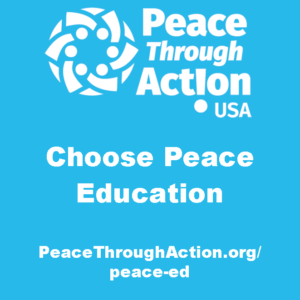What is Peace Education?
The United Nations Children’s Fund (UNICEF) defines peace education as the process of promoting the knowledge, skills, attitudes, and values needed to bring about behavior change that will enable children, youth, and adults to prevent conflict and violence, both overt and structural; to resolve conflict peacefully; and to create the conditions conducive to peace, whether at an interpersonal, intergroup, national, or international level.[1]
[1] Fountain, Susan. (1999). Peace Education in UNICEF. UNICEF New York. https://inee.org/sites/default/files/resources/UNICEF_Peace_Education_1999_en_0.pdf
How do people learn Peace Education?
There are many different peace education programs and curricula, including PeaceWorks, PeaceJam, Little Friends for Peace, and peace clubs. Educators may attend training sessions, become certified in peace education, or start local peace clubs. Books such as Live Peace, Teach Peace: Best Practices to Reverse Violence by Mary Joan and Jerry Park can help teachers bring peaceful practices to their classrooms. At home, parents may read books focused on peace education to their young children, including How Full Is Your Bucket? by Tom Rath, Mary Reckmeyer, and Maurie J. Manning and The Peace Book by Tom Parr.[2]
[2] Little Friends for PEACE. (n.d.) About Us. https://www.lffp.org/about-us.html
How do people implement Peace Education?
Students learn peace best when they are in a caring and empathetic environment. Peace education curricula fosters mutual respect and a sense of community, which improves the school climate by making students feel more comfortable and safer. This, in turn, improves their ability to learn. Conflict resolution is also a large part of some peace education curricula, helping young children learn to build trust and relationships with each other, learn what is appropriate behavior, and learn how to identify and deescalate conflict. Once children have mastered these foundational skills, they can move on to more complicated concepts such as self-control and self-empowerment, goal setting, acting with courage and conviction, and understanding violence and peacemaking.[3]
[3] PeaceWorks Peace Education Foundation. (2015) Peace Education Foundation White Paper. https://www.peaceeducation.org/wp-content/uploads/simple-file-list/Paper-on-our-model/An-Overview-of-Our-Background.pdf
For what types of circumstances is Peace Education suited?
Peace education is well suited for developing positive social and emotional behaviors among people who use it.
Does Peace Education work for preventing or controlling aggression or violence?
Peace education prevents aggression and violence by building crucial emotional, social, and empathetic skills in children and young people and by providing a safe and comfortable learning environment.[1] Students exposed to peace education curricula go out into the world with greater empathy and tolerance, conflict resolution skills, and the confidence to make social change.
[4] Barnett, R., Adler, A., Easton, J., and Howard, K. (2001). An Evaluation of Peace Education Foundation’s Conflict Resolution and Peer Mediation Program. School Business Affairs. https://www.peaceeducation.org/wp-content/uploads/simple-file-list/Paper-on-our-model/An-Evaluation-of-Peace-Education-Foundations-Conflict-Resolution-and-Peer-Mediation-Program.pdf.
Where else might I go to learn more about Peace Education?
- PeaceWorks – The PeaceWorks Peace Education Foundation provides curricula and training for teachers.
- PeaceJam – Founded by fourteen Nobel Peace laureates, PeaceJam is a global organization that provides peace curricula, hosts peace events for youth, and gives young activists a platform and community for community service and social change.
- Little Friends for Peace – Founded in 1981 by Mary Joan and Jerry Park, Little Friends for Peace is an international group that provides peace curricula and sponsors community centers and youth development.
- The United States Institute for Peace (USIP) offers this resource on peace clubs
Choose Peace Education (PDF)
Have a suggested addition to this information sheet? Send it to inbox@peacethroughaction.org.
Do Something Right Away to Increase Peace
Subscribe to our YouTube channel
Give a gift of money to support our mission delivery activities
Choose opportunities to take part in our #PeaceBeginsWithWe campaign

